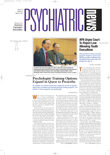Whether sitting seaside or backpacking through the mountains, the long-awaited vacation is the time psychiatrists use to rest, relax, and re-energize.
However, being away from the office can also increase psychiatrists' liability risk if they don't take steps ahead of time to ensure that patients are receiving good care during their absence.
Marynell Hinton, M.A., a senior risk manager with Professional Risk Management Services Inc. (PRMS), recently shared some risk management advice with Psychiatric News for psychiatrists about to leave for vacation.
PRMS is the company that manages the APA-endorsed liability insurance program, known as the Psychiatrists' Professional Liability Insurance Program.
Maintain Patient Privacy
Keeping a patient's medical information private is always a top priority for psychiatrists, but confidential information may be more vulnerable when the treating psychiatrist is out of the office.
During these times, psychiatrists can take extra steps to preserve patients' privacy by instructing office staff not to release confidential information to any person without advance approval.
Hinton advised psychiatrists to be attentive to potential breaches of confidentiality when using mobile phones, computers, fax machines, or voice mail because “you may be overheard or the message may be intercepted by the wrong party.”
Document All Correspondence
Documentation, the cornerstone of good risk management practices, is necessary even when psychiatrists are away.
Before leaving for vacation, psychiatrists should update patient charts for the benefit of the psychiatrists covering for them.
While away, psychiatrists should document all calls to and from patients and to and from third parties—such as a pharmacist or covering physician—concerning patients. Hinton recommended that psychiatrists use a form the size of an index card with an adhesive backing that easily fits into a pocket or purse to document calls received outside of the office.
Upon the physician's return, the cards can be affixed to the patient's medical records.
Leave Instructions
Of course, it's essential to prepare patients for scheduled absences and make provisions for coverage, Hinton said. “Be specific about the length of time of the absence and the dates of your departure and return,” she added.
It is also a good idea for psychiatrists to provide patients with written information, such as a list of names and telephone numbers to call and dates of absence, to which patients can refer while the psychiatrist is away.
Although it's standard practice in many offices, psychiatrists should leave specific instructions on voice mail with office staff, and with answering services as to how patients should be directed to services in the psychiatrist's absence.
“Make sure the information includes instructions about where patients can access care in an emergency, including going to the patient's local emergency room,” Hinton stressed.
Alert Staff to At-Risk Patients
It's essential for psychiatrists to provide colleagues who are covering for them with pertinent information about “at-risk” patients, such as those who have suicidal or homicidal ideation.
This may include information about what has helped the patient during past crises, the patient's current stressors, and whom to contact if the patient is in crises, Hinton said.
It is also important for psychiatrists to leave a number with colleagues where they can be reached if they need to be consulted in an emergency.
Vacationing psychiatrists should instruct staff on how to deal with potentially or increasingly suicidal patients and how to notify the psychiatrist after they take action involving the patient, Hinton said.
She also advised psychiatrists to “be wary of treating patients by telephone without a follow-up office visit as soon as possible.”
Monitor Prescription Needs
Hinton also offered risk management advice about prescriptions: “Try to anticipate medication refills and determine which of those will require ongoing monitoring during absences,” she said. She warned psychiatrists to lock up prescription pads while they are out of the office for any length of time.
After returning to the office, psychiatrists should save documentation such as airplane tickets, hotel bills, and coverage instructions. “These will come in handy should you be accused of malpractice during a time when you were, in fact, out of town,” she pointed out.
Learn About Patients Beforehand
Psychiatrists who fill in for their vacationing colleagues can also benefit from risk management tips that will protect them from increased liability risk.
“It's a good idea to spend some time with your colleague to learn more about those patients who might require continued assistance during the psychiatrist's absence,” Hinton said. Also, before the colleague leaves, covering psychiatrists should find out how to gain access to patients' pertinent medical information while the treating psychiatrist is away.
It's also useful for covering psychiatrists to know which hospitals their colleague admits patients to and then determine if they also have admitting privileges at those hospitals.
Whenever possible, the covering psychiatrist should admit patients to a hospital where he or she and the colleague both have admitting privileges so the patient receives uninterrupted care.
At the very least, the covering psychiatrist should admit the patient in crisis to a hospital where the treating psychiatrist can resume care when he or she returns from vacation, Hinton said.
When covering for a colleague who has a practice that includes managed care patients, psychiatrists may want to consider whether they will be paid for covering these patients.
Hinton said some psychiatrists may be able to bill on an out-of-network basis, and some managed care networks may have a provision for covering doctors that aren't designated as panel members.
Finally, if the colleague will be away for more than two weeks, the covering psychiatrist should know who in the office is designated to handle nonmedical legal and business matters.
More information on PRMS and the Psychiatrists' Professional Liability Insurance Program is posted online at<www.prms.com>.▪

